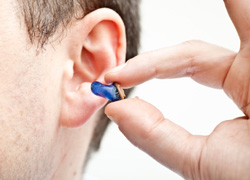Frequently Asked Questions
Hearing Loss FAQs
Can hearing loss lead to physical problems? psychological?
The only physical problem that I can think of that can be caused by hearing loss would be some sort of an accident. If you were unable to hear oncoming traffic or a warning signal like a smoke detector then serious injuries could be the result. Most of the problems associated with hearing loss are psychosocial. A large-scale study by the National Council on Aging (NCOA) found that people 50 and older with untreated hearing loss were more likely to report depression, anxiety, anger and frustration, emotional instability and paranoia, and were less likely to participate in organized social activities than those who wore hearing aids. The degree of depression and other emotional or mental health issues also increased with the severity of hearing loss (NCOA, 2007).
What do you think about the recent study linking hearing loss and dementia?
This is something that is definitely plausible. The study mentioned above was performed by Johns Hopkins and the National institute on Aging . The findings show that seniors with hearing loss are significantly more likely to have dementia. The researchers could not find any direct link as of yet, but there are some theories. One theory suggests that hearing loss affects the cognitive processing of the brain leaving it more vulnerable to dementia. Another theory is that hearing loss causes more depression and isolation and those are known risk factors for dementia (Johns Hopkins 2011).
What can people expect when they see an audiologist?
Let's discuss what an audiologist is before what people can expect when they see one. In almost 10 years of practice I have been asked if I installed home stereos, worked on sound boards for musicals or calibrate speakers for amusement parks. An audiologist is a health care professional that evaluates, diagnoses, treats and manages hearing and balance disorders in adults and children (American Academy of Audiology, 2011). Audiologists are licensed professionals that have at least a master's degree from an accredited institution in audiology. In most cases audiologists have a doctoral degree (Au.D) which was recently set to be the academic standard for new licensees.
When people see an audiologist for hearing loss they can expect a thorough case history, evaluation of their hearing and counseling on the findings. If rehabilitation of the patient's hearing loss is recommended, a thorough hearing aid evaluation will be performed. The audiologist will then suggest the appropriate hearing aid for the patient's hearing loss and lifestyle.
Hearing Aid FAQs
What tips do you have for people who are considering buying a hearing aid?
 Do your homework. One thing that I tell my patients is that we are not just here to fit hearing aids and help with hearing loss, we are here to educate. Patients are more than welcome to ask me or my colleagues during the hearing aid evaluation process to compare different levels of technologies and prices.
Do your homework. One thing that I tell my patients is that we are not just here to fit hearing aids and help with hearing loss, we are here to educate. Patients are more than welcome to ask me or my colleagues during the hearing aid evaluation process to compare different levels of technologies and prices.
I often find that people are too concerned about price and not enough about value. A hearing aid is an investment in your social life. Different people have different needs when it comes to selecting the appropriate hearing aid. If you select solely on price, you may be missing out on features and technology that will help you significantly. Your audiologist will serve as a guide in this process to help you select the most appropriate hearing aid style and level of technology.
Will a hearing aid restore my hearing to normal?
Hearing aids are designed to make things easier to hear; however they do not restore normal functioning of the ear.
I have hearing loss in both ears. Is it necessary to wear two hearing aids?
There are a few reasons why two hearing aids can be better than one:
- Better hearing in background noise.
- Improved sense of direction from where sounds are coming.
- Prevention of possible deterioration of the unaided ear.
We hear in our brain, not in our ears. The ultimate goal of hearing aids is not just to send sound into the ear. It is also essential to re-train the central auditory system in the brain. While it is uncertain whether hearing sensitivity (ability to hear soft sounds) will decrease if your ear is not stimulated adequately, research now suggests that there can be changes in the way in which your brain processes sound when it is "deprived". Thus, providing stimulation may be important in preserving your auditory potential.
When a person gets a hearing aid, how long does it take to adjust to wearing it?
Every patient wants getting hearing aids to be like getting glasses. They want to put them on and go with minimal adjustments and complaints. The thing that most people don't understand is that it's just not that easy. Adjusting to hearing aids is different because the issues that arise are completely subjective. Have you ever complained to your optometrist that you "see too much?" Because your brain has been deprived for so long (of hearing) patients will hear things that they haven't heard in a long time. These things may sound loud, tinny, sharp, echoic etc. This is the subjective side of hearing aids.
While each person's experience will vary, hearing aids may allow a person to hear certain sounds they have not heard before (or have not heard for many years). Re-learning takes place in the central auditory nervous system, and the brain needs some time to learn to use the new sound. You will have a trial period that allows you to adjust to the new sound and evaluate your benefit from the aids.
Adjusting to new hearing aids depends on a number of factors:
- If you have ever had hearing aids before. It's easier because you know what to expect.
- How much hearing loss is present?
- How long has it been present?
- Patient's drive and ambition to hear better.
- The support network around you to improve your well being.
There are other factors that contribute as well, but these are some of the main ones. The good news is that we as audiologists are trained to counsel and facilitate as seamless of a transition as possible so that you can adapt to your hearing aids quickly with minimal problems. Also, with today's technology, most hearing aids function automatically making it more comfortable and easier to adjust to new hearing aids.
Will a hearing aid last forever?
The life of a hearing aid is approximately 5-7 years. Many hearing aids are still functioning well after six years, while most need some tune-up and repair services after 1-2 years.
How long do hearing aid batteries last?
This depends on the number of hours per day the hearing aid is worn and the type of battery. The larger the battery, the longer it will last. A battery can last from three days to three weeks.
Why do some hearing aids whistle?
The whistle you hear is called feedback. External feedback is produced by leakage of amplified sound out of the ear canal and back into the microphone of the hearing aid. It is normal for feedback to occur when the hearing aid is being inserted or removed or when your hand is cupped near the device. If however, you experience feedback when you speak, chew, yawn, or change position, you need to consult your audiologist. Feedback is more likely to occur in smaller hearing devices because the microphone is closer to the speaker port where the sound comes out into the ear. So, a behind-the-ear style may be less likely to produce feedback than an in-the-canal style device.
Why do hearing aids cost so much?
You can expect to pay from $1800 to $3300 per hearing aid. In general, the more features a hearing aid has, the more expensive it will be. The high cost reflects the technology used to develop the miniature components of the aid, and the mark-up covers the dispenser's services. If hearing aids were sold as often as calculators, the price would drop considerably. However, they are a low-volume item as markets go. Additionally, the cost of follow-up visits with the audiologist is usually included in this price.
Do you know of any help available to pay for a hearing aid?
Contrary to the belief of many of our patients, Medicare and adult Medicaid do not cover hearing aids. In fact, very few private health insurances cover hearing aids.
The state has programs through Vocational Rehabilitation services to help people that are employed with their hearing difficulties at work. Another program through the state will help you get one hearing aid if you have difficulty hearing on the telephone. The program is called "The North Carolina Telecommunications Equipment Distribution Program (NCTEDP)". To qualify, you must show financial hardship and a significant hearing loss. Our office does not participate with this program.
We currently offer financing through Care Credit.
